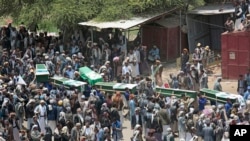Saudi Arabia said on Monday it was working hard to correct mistaken targeting by its military coalition in Yemen that has killed civilians including children, but U.N. rights experts voiced scepticism.
International pressure mounted on the kingdom, including from allies, to do more to limit civilian casualties in a 3-1/2 year civil war that has killed more than 10,000 people and pushed the already impoverished country to the brink of famine.
Saudi Arabia leads a coalition of Arab states fighting against the Houthi movement that controls Yemen's capital.
The U.N. Committee on the Rights of the Child on Monday examined the Saudi record on compliance with a treaty protocol on children in armed conflict, and repeatedly raised the issue of children killed by coalition attacks in Yemen.
“This has been going on a number of years. But still there is no information that any perpetrators or people responsible for these kinds of actions have been prosecuted or sanctioned or dealt with in any way,” said panel vice chair Clarence Nelson.
Osaiker Alotaibi of the Saudi defense ministry told the panel of 18 independent experts that the Saudi-led alliance was committed to upholding international humanitarian law. The coalition had a list of 64,000 potential targets in Yemen that were off limits to attack, including schools and hospitals.
Coalition investigations had uncovered “the existence of certain unintentional mistakes in a number of these operations,” Alotaibi said. “The task force recommended that perpetrators should be held to account and victims should enjoy redress.”
Renate Winter, panel chairwoman, asked why schools and hospitals had been repeatedly struck: “You say it’s an accident.
How many such accidents can you bear and how many such accidents can people in the country (Yemen) bear?”
Winter then referred to an airstrike on a school bus in August in Saada province in north Yemen that killed dozens.
The Saudi-led coalition said on Sept. 1 that it accepted that the air attack had killed dozens of people, including children on a bus, and that it was unjustified. It pledged to hold accountable anyone who contributed to the error.
The convoy in Saada had “carried some Houthi military staff,” said Bandar Alaiban, president of the Saudi Human Rights Commission who led a government delegation. “However the airstrike was not conducted in line with the rule of engagement because that convoy did not represent a risk to the coalition.”
He blamed the Houthis for putting civilians including children in danger by using schools and hospitals as “refuges.”





